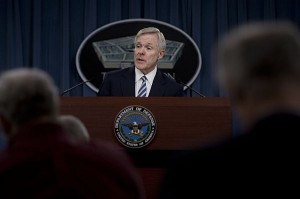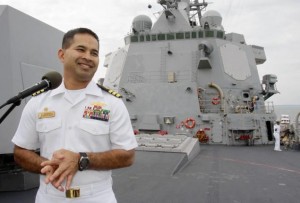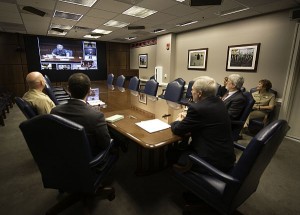 The fallout from the Glenn Defense Marine Asia (GDMA) scandal is wide-ranging…but just how wide-ranging is it?
The fallout from the Glenn Defense Marine Asia (GDMA) scandal is wide-ranging…but just how wide-ranging is it?
We don’t know yet, but I worry that the strategic impact of this scandal may well be greater than the arrests and sensational headlines suggest.
Even worse, the SECNAV told us last month that this scandal is not over.
So, while we wait for the next shoe to drop, let’s take a moment to examine the less immediately obvious–but potentially high-impact–losers in the Glenn Defense Marine Asia Scandal: The Officer Corps, The Office of the Under Secretary of the Navy, and The CNO’s tenet, “Operate Forward”.
The Officer Corps:
As the SECNAV hinted at in his late-2013 press conference, the GDMA investigation likely began in 2010. That means the scandal has had a few years to ripple through the entire organization. Given that Glenn Defense Marine Asia’s efforts to woo the Navy’s emerging leaders apparently began far earlier than 2010, the number of officers who were potentially tainted must be rather high.
 And with the SECNAV learning about the scandal months before it broke in September 2013, knowledge of this scandal must have percolated through the higher-ranking officer corps.
And with the SECNAV learning about the scandal months before it broke in September 2013, knowledge of this scandal must have percolated through the higher-ranking officer corps.
Potentially compromised Admirals or SES “in the know” (or those who were informed by friends) may have already shown themselves to the door. With the Navy already signaling that it will likely not pursue officers who have retired, it might be interesting to see if officers with exposure to the Pacific are retiring early or at a higher than average rate. And though nobody will be sad to see potentially compromised (or just tired and demoralized) officers leave the service, that loss of experienced leadership comes with a strategic price.
Even worse, Leonard Glenn Francis has allegedly spent years and years targeting younger officers who were the best-of-the-best—the ones destined to be the Navy’s future (and the Navy’s future leaders in the Asia-Pacific, no less).
That is a real strategic tragedy.
And it is not over yet. The Navy does not convene a team to review cases and dispense justice (and give it a Grim Reaperesque title of “Consolidated Disposition Authority”, no less) unless…the organization expects that team to be relatively busy.
The Office of the Navy Under Secretary:
The functional heart of the Glenn Defense Marine Asia scandal is, frankly, a business operations scandal. And the Under Secretary of the Navy, in the role of the Chief Management Officer, is the corporate officer responsible for the Navy Department’s business operations.
 Port Calls are tough–I’ve sat in on a few planning sessions for domestic port calls–and business-wise they’re just…mind-numbingly awful (Me, I’d rather grapple with a full-on yard refit. In a sub. With Rickover back in charge). In my mind, the NAVSUP-administered (The Naval Supply Systems Command) process for port visits needs tweaking.
Port Calls are tough–I’ve sat in on a few planning sessions for domestic port calls–and business-wise they’re just…mind-numbingly awful (Me, I’d rather grapple with a full-on yard refit. In a sub. With Rickover back in charge). In my mind, the NAVSUP-administered (The Naval Supply Systems Command) process for port visits needs tweaking.
The impact of the 2010 consolidation of support services to three Fleet Industrial Supply Centers has got to be examined—if the consolidation led to the uncovering of the current scandal, that’s great, but, given things like, oh, the fact that Glenn Defense Marine Asia was out there winning Navy business despite proffering obvious low-bid “sucker” contracts, consolidation probably made things a bit tougher (particularly for the two FISCs where more ships are arriving and commanders are pressing for additional port calls).
Let’s not kid ourselves–consolidation is shorthand for reducing—rather than growing—staff. I strongly suspect that the business-minded processes used to determine Supply Center manning needs has not caught up with a geopolitical strategy that calls for ramping up forward-deployed Navy ships and an aggressive uptick in port calls.
The 2009-10 consolidation and a similarly-timed transition to different cost-monitoring and auditing systems may have also impacted the Navy’s ability to detect problems in a prompt fashion. Now…we, in the public, don’t know if these systems helped detect problems or not. But systems were put into place to help ID Port Visit cost discrepancies, and it would be good for the public and policymakers to know if they worked or not–if they did work, then somebody needs to get some credit. And a medal. If they did not work, then why didn’t they?
The support organizations sit at the intersection of too many budgets—the Fleets have a Port Call budget, Type Commanders have their budgets, the visiting ship itself has another pot of money—making it too easy for a savvy supplier to play each party off one another to, say, make an overcharge disappear in the space where someone’s jurisdiction begins and another’s ends. It also makes it hard for somebody in Navy management to take a unified look at expenses to identify areas of potential problems—a Fleet planner may ID one thing, while the other folks are not informed until later.
Anyway…I’m in the weeds (and thanks for indulging!). But my small technical rant should give you an idea of some of the business challenges. Port Call planning and Port Call cost management is all an ugly business mess that needed (and obviously still needs) the attention of a dedicated, powerful business manager. And that…is a job for the Under Secretary of the Navy.
So…that is why I am calling the position of Under Secretary a likely loser—because fixing the Port Call business system morass and forcing coordination between several VERY separate business units is going to be tough.
The last Navy Under Secretary, Robert Work, got out in April 2013, a mere five months before the burgeoning GDMA scandal broke into the open. I like Mr. Work. He is a consummate strategist, and considered one of the most “engaged and active” undersecretaries in recent years, but the GDMA scandal may color Work’s legacy as Navy Under Secretary, and may even weigh upon his potential nomination as the Pentagon’s Deputy Secretary of Defense. If Mr. Work is the nominee, it would be in Mr. Work’s benefit to be confirmed before anything else with GDMA breaks. It may also be in Mr. Work’s interest to be ready to identify what pieces in the Port Visit business infrastructure worked and what didn’t–Hopefully Mr. Work’s efforts helped catch the bad actors.
This scandal may make the Navy Under Secretary post even harder to fill. Right now, only a masochist could still want the job, and, if the scandal keeps growing, only a very talented masochist will get it.
 Jo Ann Rooney, nominated just days before the scandal went public, stumbled in her October 2013 confirmation hearing, and subsequent Senate holds prevented her from assuming the post in a timely manner. In the meantime, the GDMA scandal has done nothing but grow, offering the Senate additional opportunities to develop more qualms over Ms. Rooney’s suitability for the now scandal-encumbered post. (With more GDMA-related developments looming, it only further exacerbates the impact of Ms. Rooney’s squabble with the Senate over a Uniform Code of Military Justice issue.)
Jo Ann Rooney, nominated just days before the scandal went public, stumbled in her October 2013 confirmation hearing, and subsequent Senate holds prevented her from assuming the post in a timely manner. In the meantime, the GDMA scandal has done nothing but grow, offering the Senate additional opportunities to develop more qualms over Ms. Rooney’s suitability for the now scandal-encumbered post. (With more GDMA-related developments looming, it only further exacerbates the impact of Ms. Rooney’s squabble with the Senate over a Uniform Code of Military Justice issue.)
So what do we do?
In the end, if nominated, Robert Work needs to be confirmed as DOD’s Deputy Secretary of Defense ASAP, before more of the scandal breaks and folks start asking “What did he know and when did he know it?” And if Mr. Work helped institute the business reforms and practices that helped reveal the GDMA Scandal, policymakers should be told and Mr. Work should get some credit for his, um, work.
As for the next Under Secretary, SECNAV Mabus’ choice is this: If the scandal evolves and he is still struggling to get Ms. Jo Ann Rooney confirmed, then have Ms. Rooney repackaged as an anti-corruption business management crusader. If Ms. Rooney’s nomination is already fatally compromised, SECNAV should use the GDMA scandal to make a clean break for somebody more suited to cleaning up the mess.
Operating Forward:
CNO Greenert’s effort to push the Navy forward is likely to hit a speed-bump. I will be willing to bet that the number of port calls in Asia will decline as the Navy sorts itself out.
And I certainly don’t need to remind regular readers that any missed port call is a strategic and operational failure.
It’s going to be tough. I detailed some of the complex business challenges above. But as support contracts and forward maintenance efforts get hit by auditors–and while those personnel responsible for carrying out support contracts and maintenance enter into a collective defensive crouch, port calls are going to be difficult for everybody. As I have mentioned before, the time-honored flexibility that comes from a savvy SUPPO cutting through red tape (picture a Navy version of Radar O’Reilly) is gone, and the folks responsible for forward operations will be working overtime to ensure they have institutional cover. It will all be a costly, slow-going mess.
(Let me put it this way. If you know a SUPPO aboard a forward-operating vessel or a contracts officer operating abroad, this is a year to send them many, many care-packages (but—before you send anything–have the recipient check with their JAG to make sure they can accept what you might be sending!).)
Conclusions:
This GDMA mess is a regrettable scandal, and one that can be traced back to—in my opinion—a lack of engaged back-room support, a failure in fundamental business organization/practices (some of these issues would have been caught far faster within the context of a commercial business), and the Navy’s underlying culture.
We have gone through years and years of beating up and cutting back-room business support. But…with minimal manning, you’re going to get stressed back-room workers who are only capable of focusing on the immediate challenge–on “putting out fires’. And you will not get workers who ask “Hey, is this….right?” and who have the time and support to go out, research the record, target potential discrepancies and then fix ‘em before they become all-consuming scandals. It’s fine to put warfighting first, but, please, let’s realize that any fight requires a good cadre of Radar O’Reilly types.
Anyway…that said, the fundamental problem here is that Navy leaders were manipulated by a businessman and accepted bribes to help a contractor take advantage of their shipmates. The whole business has a nasty feel to it–that sleazy back-door deals are the rule rather than the exception.
This systemic failure of trusted up-and-coming officers to support fellow shipmates raises a specter that there is a malaise setting into the Armed Services–that the mission doesn’t matter, and that only the corrupt get ahead. To me, it…well…it feels like some folks in the U.S. Armed Forces and Intelligence Services are acting just like their Soviet comrades did in the late ’80s.
And that’s…worrisome.
(UPDATE: Hey CHINFO–Thanks for including me on CLIPS today, but please note that I am NOT with Austal. I’m just speaking for myself here, and if I have funding to write about something in particular, you’ll always see a disclaimer.)


{ 2 comments… read them below or add one }
This had been going on forever. I was stationed in Japan from 2005 to 2010. Leonard and his Officers parties were legendary. So were the sky high charges to the ships for port services. Everyone knew it was crooked and some reported it anonymously. All reports were routinely squashed and God help you if they found out who it was.
I worked in this office…talk about dirt piled high.